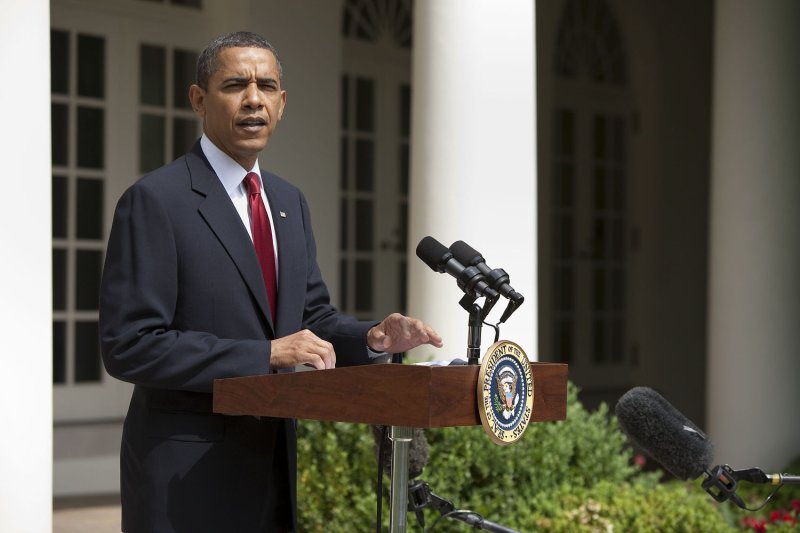1 of 8 | U.S. President Barack Obama speaks from the Rose Garden of the White House in Washington about reports that North Korea tested a nuclear bomb on May 25, 2009. (UPI Photo/Joshua Roberts/POOL) |
License Photo
WASHINGTON, May 27 (UPI) -- North Korea has threatened war against South Korea and handed U.S. President Barack Obama his first major international security crisis.
The South Korean government of President Lee Myung-bak responded Tuesday to North Korea's second nuclear test by joining the United States in the Proliferation Security Initiative to share intelligence and attempt to search ships carrying nuclear technology to proliferate weapons of mass destruction.
But the response from North Korea was swift: Pyongyang came close to issuing its own declaration of war against South Korea and, by extension, even the United States.
The North Korean government stated that if South Korea joined the United States in an effort to search ships for nuclear weapons, it is declaring war. The North would attack the South if any of its ships were searched. It also said it was no longer tied to the 1953 truce that served as a shaky end to the three-year Korean War.
The North also test-fired three short-range ballistic missiles off its east coast Tuesday and told other nations to avoid the area Wednesday as well, indicating they might fire more.
On Monday North Korea carried out an underground nuclear test. The nuclear blast was estimated to have the power of the bombs the United States dropped on Hiroshima and Nagasaki -- relatively small but still potentially devastating. North Korea blamed U.S. aggression and the threat of invasion as the reason for the flurry of tests.
South Korea's Yonhap news agency reported that several South Korean government sources said those launches may not just have been for the sake of posturing or bluster, but to deter U.S. and South Korean aircraft from making surveillance flights in the region to confirm and gather additional data about the nuclear explosion.
The U.N. Security Council met and roundly criticized the tests. Obama said he "strongly condemned" the North Korean officials' "reckless action."
Susan Rice, the U.S. ambassador to the United Nations, announced that the United States, Russia, China, Britain and France, the five permanent members of the Security Council, held talks with representatives from South Korea and Japan Tuesday to coordinate their response to the North Korean tests and statements. She said they held "very serious, concrete talks" about approving a U.N. resolution to create new economic sanctions against North Korea.
However, the international community appears to have no effective sanctions short of war that could convince North Korea to dismantle its nuclear program. Pyongyang has shrugged off all previous attempts at imposing economic sanctions, and while Russia and China both publicly condemned this week's nuclear test, neither country looks likely to allow the United States to push through tougher sanctions. Moscow and Beijing both have the veto powers of permanent members of the Security Council with which they can block such measures.
The North appears increasingly confident that it can defy Obama and his new administration. South Korean media reports claim that the North has reactivated its nuclear reprocessing facility at Yongbyon. In 2007 the North cut a deal with the group of six nations' disarmament process in Beijing to shut down Yongbyon. But in April the North Korean government announced it would reactivate the reprocessing complex after the U.N. Security Council condemned it for testing a new intercontinental ballistic missile.
The Chosun Ilbo newspaper in Seoul reported that U.S. surveillance satellites had monitored steam emerging from a reprocessing facility at Yongbyon. The North Koreans have amassed 8,000 used nuclear fuel rods at Yongbyon that could be reprocessed into between 13 pounds and 18 pounds of plutonium. That would be enough to make at least one nuclear weapon.















